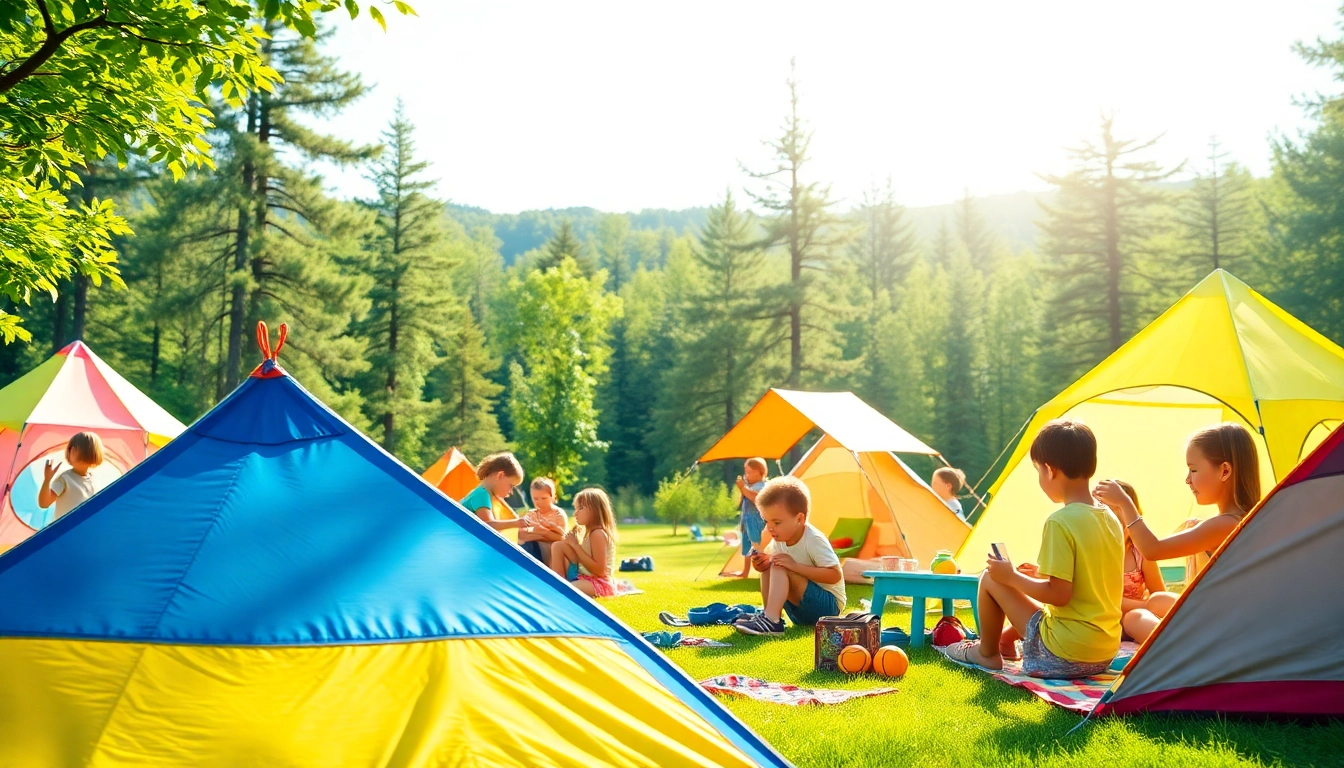
Understanding Holiday Camps
What Are Holiday Camps?
Holiday camps are organized programs designed primarily for children and teens to engage in activities during school breaks. They provide a structured environment where young people can learn new skills, develop friendships, and discover various interests. Holiday camps come in various forms, including day camps, overnight camps, and specialized camps focused on specific activities such as sports, arts, or outdoor adventures. The essence of these camps is to provide enriching experiences away from the routine of daily life while ensuring children have fun in a safe setting.
Benefits of Attending Holiday Camps
Attending holiday camps can have numerous benefits for children and teens. Among these are:
- Socialization: Camps provide an excellent opportunity for participants to meet peers, make friends, and improve their social skills. Group activities foster teamwork and communication, crucial elements for personal development.
- Skill Development: Many holiday camps focus on specific skills, whether sports, arts and crafts, or technology. This helps participants discover talents and interests that they may not explore in a traditional school environment.
- Independence and Confidence: Being away from home and engaging in new experiences can boost a child’s confidence. Learning to navigate challenges independently prepares them for future experiences in life.
- Health Benefits: Physical activities are a staple in most camps, encouraging children to stay active, learn about fitness, and have fun while doing it.
- Cognitive Growth: Camps often include educational components that stimulate learning outside the classroom, making the experience both fun and informative.
Types of Holiday Camps Available
When considering holiday camps, parents and guardians will find a wide variety of options available to suit different interests, age groups, and needs:
- Sports Camps: These camps focus on specializing in various sports, offering training and practice in activities like basketball, soccer, swimming, or gymnastics.
- Arts Camps: Perfect for creative souls, these camps provide a platform to explore visual arts, music, dance, theater, and more.
- Outdoor Adventure Camps: Emphasizing nature and outdoor skills, these camps might include hiking, camping, canoeing, and survival skills.
- Academic Camps: Targeted towards education, these camps may cover subjects such as science, technology, engineering, and mathematics (STEM), enhancing students’ understanding and interest in these areas.
- Special Needs Camps: These camps cater to children with specific requirements, ensuring an accommodating and nurturing environment.
Finding the Right Holiday Camp
Researching Holiday Camps
Finding the perfect holiday camp for your child can be an exciting yet daunting task. To streamline your search, begin by gathering information:
- Start Online: Explore websites, forums, and social media platforms to read reviews, feedback, and recommendations from past attendees and their parents.
- Check Local Listings: Many communities offer listings of local holiday camps. This ensures that you’re exploring options that are geographically convenient.
- Contact Camp Officials: Reach out to camp organizers with specific questions about their programs, safety measures, and staff qualifications. This will provide you with a clearer picture of what to expect.
Choosing the Right Activities
Aligning your child’s interests with the activities offered at a camp is crucial. Consider the following aspects:
- Interest Alignment: Ensure that the camp offers activities that captivate your child. Whether they are drawn to sports or arts, aligning their preferences will enhance their overall experience.
- Age Appropriateness: Check that the camp’s offerings match the developmental stage of your child. Activities should be challenging yet achievable to foster a sense of accomplishment.
- Diversity of Activities: Camps that provide a mix of different activities can keep your child engaged and assist in developing various skills.
Evaluating Camp Locations
The location of the holiday camp can significantly impact the experience. Factors to evaluate include:
- Proximity: The camp should ideally be within a reasonable distance from home to avoid long travel times. This often ensures greater peace of mind for both parents and children.
- Safety: Review the camp’s safety protocols, emergency procedures, and general environment. A reputable camp prioritizes participant safety and well-being.
- Aesthetic Appeal: The natural surroundings and aesthetics of the camp can affect participants’ enjoyment. Locations that inspire and engage help make the experience memorable.
Preparing for Holiday Camps
Packing Essentials for Camp
Proper preparation is vital for having a successful camp experience. Consider these essential packing tips:
- Clothing: Pack suitable clothing for varied weather conditions and camp activities. Include items such as swimwear, outdoor apparel, sturdy footwear, and comfortable daily wear.
- Personal Items: Include essential toiletries, comfort items (like a favorite pillow or stuffed toy), and any specific medications or dietary supplements.
- Equipment: Ensure any necessary equipment (sports gear, art supplies, etc.) is packed, keeping in mind the camp’s recommendations.
Setting Expectations with Children
Effective communication with your child about the upcoming camp experience can significantly enhance their enjoyment. Here are a few tips to set clear expectations:
- Discuss the Schedule: Familiarize them with the daily routine and activities planned. This can help alleviate anxiety surrounding the unknown.
- Talk About Friendships: Encourage them to be open to meeting new friends and forming bonds with peers. Foster an understanding that making new friends is an integral part of the experience.
- Address Fears: Talking about any fears or anxieties your child may have can help them feel supported and understood.
Health and Safety Considerations
Health and safety are paramount at holiday camps. Consider the following factors to ensure a safe experience:
- Health Forms: Complete any required health forms accurately. This helps camp staff prepare for any medical needs or allergies.
- Emergency Contacts: Ensure that your child knows how to reach you in case of an emergency. Additionally, inform camp staff about any specific emergency procedures.
- Inquire About Staff Training: Understanding the qualifications of camp staff, especially regarding first aid and emergency response, can provide peace of mind.
Making the Most of Holiday Camps
Encouraging Social Skills at Holiday Camps
Social skills fostered at camp can benefit children long after they return home. Here are some ways to encourage social interaction:
- Promote Team Activities: Engaging in team sports or group projects encourages children to collaborate with their peers.
- Challenge Communication: Encourage children to express their thoughts and feelings with others. This could be facilitated through camp activities that require sharing and discussion.
- Model Behaviour: Lead by example. Children often mimic adult behaviors, so display strong social skills to influence their interactions.
Participating in Camp Activities
Active participation in camp activities enhances the experience and development of various skills:
- Be Open-Minded: Encourage your child to try new activities, even those that seem intimidating at first. Often, new experiences yield the most significant personal growth.
- Set Personal Goals: Help your child set achievable personal goals during camp. This approach can promote self-motivation and encourage persistence.
- Be Involved: If possible, participate in family days or events that allow you to engage with your child’s camp experience actively.
Building Lifelong Memories
The memories created at holiday camps can last a lifetime. To enhance the retention of these experiences:
- Document Experiences: Encourage your child to keep a camp journal where they can write about their daily activities and feelings.
- Create Keepsakes: Collect mementos from camp, such as photographs, crafts, or awards. These items serve as tangible reminders of the camp adventure.
- Share Stories: Upon returning, sit down with your child to share stories about their experiences. This reflection helps solidify the memories made throughout their time at camp.
Post-Camp Reflections
Discussing Experiences After Camp
Engaging in post-camp discussions can be a rewarding experience for both you and your child. This dialogue can help children process their experiences while keeping the camp spirit alive:
- Ask Open-Ended Questions: Encourage your child to elaborate on their feelings about camp. Questions like, “What was your favorite activity?” or “Did you make any new friends?” can prompt deeper discussions.
- Encourage Expression: Allow your child to express both enjoyable moments and challenges faced during camp. Validating their experiences can foster emotional intelligence.
- Share Your Own Emotions: Sharing your excitement about their experiences can create a positive atmosphere for reflection.
Keeping the Camp Spirit Alive
Maintaining the camp spirit post-camp can enhance your child’s emotional well-being. Here are ways to keep the experience alive:
- Regular Communication: Encourage your child to keep in touch with camp friends through letters, phone calls, or social media.
- Plan Activities Inspired by Camp: Continue engaging in activities your child enjoyed at camp. Whether it’s a sports game or an art project, this continuation can help them remember their camp experience fondly.
- Host Camp Reunions: Consider organizing a reunion with children from camp to rekindle friendships and share stories.
Planning for Future Holiday Camps
As the camp season concludes, it’s never too early to plan for the next adventure. Consider these strategies for future camps:
- Encourage Feedback: After the camp experience, obtain feedback from your child about what they liked and what they would like to change. This will help in selecting even better camps in the future.
- Research New Camps: Keep an eye out for emerging camps that may offer different themes or activities to broaden your child’s experiences.
- Discuss Goals: Talk with your child about what they hope to achieve at future camps and how to set specific objectives to reach those goals.






